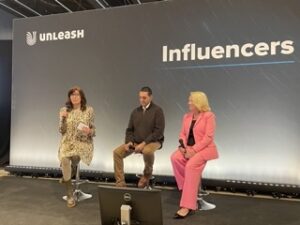Who's that Girl?
Leadership Intent- The Most Important Thing To Understand
Originally posted: June 25, 2010 on TrishMcFarlane.com
As many readers know, I am attending the Leadership Experience at Gettysburg this week. This event is part of the leadership offerings from The Conference Board. They invited me to attend and write about the event. They did not direct me in what to write or how to write it though, so all thoughts and impressions are mine.
That said, I think this is an event that everyone should attend. Notice I did not say just leaders or just people from a certain industry. I didn’t say that Boomers would benefit more than Gen X or Gen Y. I didn’t say that you should be black, white, Asian, or Hispanic. EVERYONE. Why? Because we all need leadership and we can all learn from leadership examples in the past.
I’m someone who needs some time to absorb things before writing about them in a manner that does it justice. That said, there is one point that came up again and again that I must share now. In the moment. Even as I have one more day of the event to attend. The point is this:
If you do not understand the leader’s intent, you cannot possibly be successful. Conversely, if you are the leader and you have not adequately conveyed your intent, your leadership team will not succeed.
That is a bold statement, so I have been thinking about it for the last few weeks. I was not a particular history buff when it came to the Civil War, or Gettysburg in particular. However, after reading The Killer Angels, watching the movie ‘Gettysburg’ and now being here live and in person, I can share that the lessons that played out here on the battlefields were numerous.
The most important ones all come back to the success of the Army of the Potomac KNOWING, communicating, and reacting to the leader’s intent, the leader being General Meade. Each of his direct reports in his leadership team had some degree of autonomy in decision making as long as that decision tied back to the intent of the mission.
Several of his leaders, Buford and Chamberlain in particular, understood Meade’s intent and made their own divergences contrary to orders based on knowledge they had that their actions would further the mission. This was based on Meade’s intent. Sickles, on the other hand, was a renegade and did not. His disobedience was not something that furthered the leaders’ intent and he was ultimately driven back.
My question to you is this…..how have you seen this played out correctly in the corporate world, and how have you seen it fall apart? What happens when the 2nd line leaders make decisions that are contrary to the main leader’s intent? Share in the comments please. This will also further our discussion at Gettysburg.
Author
Categories
Tags
Share
Related Posts
How we can help
Led by Trish Steed and Steve Boese, H3 HR Advisors harnesses over 40 years of experience to delivery HCM insights and guidance to global organizations.
H3 HR Advisory services
By leveraging technology, analytics, and our deep industry knowledge we can help you to reposition your workforce and ensure that you have the right people with the right capabilities in the right roles to positively impact the growth of your business.
HR Happy Hour Podcast Network
Created in 2009, The HR Happy Hour Show is hosted by Steve Boese and Trish Steed and is the longest continuously running internet radio show and podcast on Human Resources, HR Technology, Talent Practices, Workplace and Leadership topics.
H3 HR Speaking Services
We work closely with every client to customize your content - keynotes, webinars, research, infographics, and buyer’s guides - to inspire, educate and inform the audience enabling you to reset and realign your organization for a talent-led breakthrough.
Get in touch
Talk to us today and find out how we can help you and your organization leverage HCM technology to attract, onboard, retain and manage top talent.


